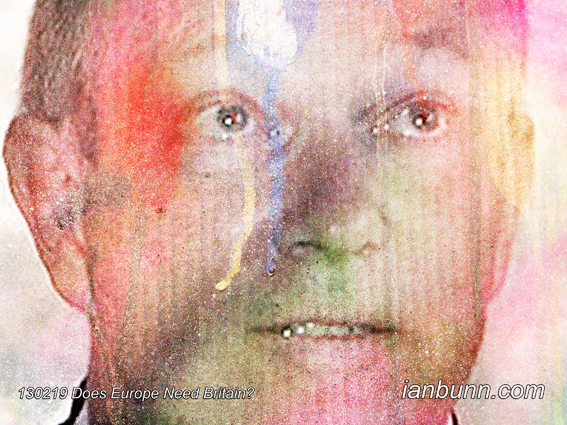![Llyn Foulkes the 78 year old American artist creating landscape paintings that utilized the iconography of postcards, vintage landscape photography, and Route 66-inspired hazard signs, returning to his childhood interest in one-man bands and began playing solo with "The Machine," which he created. Foulkes has been interviewed by Scott Indrisek in an article published in Blouin Artinfo titled ‘Renegade Llyn Foulkes is Making a Comeback With a Major Survey at the Hammer’. Indrisek states “…Foulkes is having his second big moment. The L.A. artist and musician showed with Ferus Gallery in the 1960s and enjoyed early recognition for quirky, detailed oil paintings — an enormous cow, or rocks that sort of looked like people. He later moved on to more complicated mixed-media works, creating intricate scenes that brought together cartoon culture and self-portraiture as well as an ongoing series of grotesque bloody heads. …Foulkes had had a few recent pieces in last year’s Documenta (13) exhibition, where he also sang and performed with his complicated, self-made musical instrument, dubbed the Machine. [in the interview Foulkes states] “…Early on in the ’60s I was pretty well known, and then I gave up what I was doing and tried to go back to what I was doing before. Art changed, Minimalism and installation art and all that stuff came in, and there wasn’t that much in the art magazines about me in the ’80s. I’ve had problems from the stock market of art — let’s put it that way. I’ve always been out of the mainstream because I always talk against what’s going on in art. …I’ve always been pretty much a loner, in the sense that I didn’t really associate with that many other artists...” Inspired by Scott Indrisek, Blouin Artinfo ow.ly/hMxcu Image source Facebook ow.ly/hMxca](http://www.ianbunn.com/wp-content/uploads/2013/02/130228dcU60.jpg) I’ve always been out of the mainstream (February 28 2013)
I’ve always been out of the mainstream (February 28 2013)
Llyn Foulkes the 78 year old American artist creating landscape paintings that utilized the iconography of postcards, vintage landscape photography, and Route 66-inspired hazard signs, returning to his childhood interest in one-man bands and began playing solo with “The Machine,” which he created. Foulkes has been interviewed by Scott Indrisek in an article published in Blouin Artinfo titled ‘Renegade Llyn Foulkes is Making a Comeback With a Major Survey at the Hammer’. Indrisek states “…Foulkes is having his second big moment. The L.A. artist and musician showed with Ferus Gallery in the 1960s and enjoyed early recognition for quirky, detailed oil paintings — an enormous cow, or rocks that sort of looked like people. He later moved on to more complicated mixed-media works, creating intricate scenes that brought together cartoon culture and self-portraiture as well as an ongoing series of grotesque bloody heads. …Foulkes had had a few recent pieces in last year’s Documenta (13) exhibition, where he also sang and performed with his complicated, self-made musical instrument, dubbed the Machine. [in the interview Foulkes states] “…Early on in the ’60s I was pretty well known, and then I gave up what I was doing and tried to go back to what I was doing before. Art changed, Minimalism and installation art and all that stuff came in, and there wasn’t that much in the art magazines about me in the ’80s. I’ve had problems from the stock market of art — let’s put it that way. I’ve always been out of the mainstream because I always talk against what’s going on in art. …I’ve always been pretty much a loner, in the sense that I didn’t really associate with that many other artists…”
Inspired by Scott Indrisek, Blouin Artinfo ow.ly/hMxcu Image source Facebook ow.ly/hMxca
![David Runnalls the Canadian writer and environment columnist, former Board member of IUCN-the World Conservation Union, and current Distinguished Fellow with IISD, has published an article in The Globe and Mail titled ‘Roasted, toasted, fried and grilled’: climate-change talk from an unlikely source ‘. Runnalls states “ This past little while has seen some statements from unlikely sources about the critical economic importance of dealing quickly with climate change. President Barack Obama led off the batting with his inaugural address, calling on Americans to take the lead in developing the technologies necessary for the emerging low-carbon economy. He pointed to the drought and Hurricane Sandy as the most recent evidence that our climate is changing for the worse. But the most startling statements came from the heads of those bastions of economic orthodoxy: the World Bank and the International Monetary Fund. …[head of the IMF Ms. Lagarde] said: “Unless we take action on climate change, future generations will be roasted, toasted, fried and grilled.” Jim Yong Kim, president of the World Bank, went so far as to insist that climate change be at the top of the Davos agenda, along with finance and growth, “because global warming imperils all of the development gains we have made.” …These statements are not from the head of Greenpeace or from David Suzuki. They come from the heads of the bulwarks of the international financial system. For years, the IMF has resisted straying into the realm of environment and finance, viewing it as a side issue best left to international environmental organizations. And while the World Bank has invested in low-carbon futures and has been active in climate talks, the issue has not been raised to the top of its agenda. Until now. Climate change as the main economic discussion point at the annual meeting of the rich and famous leaders of governments and multinational enterprises?” Inspired by David Runnalls, The Globe and Mail ow.ly/hMwGA Image source CIGI ow.ly/hMwF2](http://www.ianbunn.com/wp-content/uploads/2013/02/130227dcU60.jpg)
![Fawzi [Fouzi] Khaled Abdullah Fahad Al Odah the 35 year old Kuwaiti citizen and teacher held in the US Guantanamo Bay detainment camp in Cuba for the past 11 years without charge has been featured in the New York Times. Fawzi traveled to the Pakistan/Afghanistan border area in order to undertake charitable outreach work. Following the September 11, 2001 attacks, Fawzi fled Afghanistan, intending to return home to Kuwait, however having crossed the border into Pakistan he was captured by Pakistani bounty hunters who handed him along with eleven other Kuwaitis over to American authorities. The Kuwait Freedom Project established to seek the release of Fawzi and other Kuwaiti detainee’s reports that Fawzi spent his summers traveling in poor nations to educate less fortunate students, and along with his family have built libraries and wells in Africa. They’ve sponsored orphans in countries including Albania. Fawzi has not had any weapons training or experience, writing to his parents in 2002 stating, “Now I am detained by the American forces and investigations are still going on…I will be established as innocent soon, and then I will return back to you…” Fawzi’s father, Khalid Al-Odah, is the head of the Kuwaiti Family Committee, an organization formed by relatives of the detainees to advocate for their just treatment under the U.S. judicial system. The elder Al-Odah is a former member of the Kuwaiti Air Force, who trained with American servicemen in the United States and flew missions with them as an ally in the Persian Gulf War of 1991. … The U.S. Government contends that Fawzi’s true purpose in Afghanistan was to join the Taliban and al Qaeda referring to "additional incriminating evidence" discovered since his capture, however the nature of that evidence is redacted in the unclassified version…” Inspired by Project Kuwaiti Freedom ow.ly/hMvRJ Image source Wikipedia ow.ly/hMvQa](http://www.ianbunn.com/wp-content/uploads/2013/02/130226dcU60.jpg)
![Luis Barcenas Gutierrez the 55 year old Spanish politician and Treasurer in the People's Party (PP) who has been embroiled in political corruption scandals, has shaken the ruling conservative party as the damaging corruption scandal spreads. The Economist magazine has published an article titled ‘Another Blow’ stating “…The pivotal character in the scandal is Luis Bárcenas, a party administrator for two decades, whom the party made a senator in 2004 and Mr Rajoy [Spanish Prime Minister] himself promoted to treasurer in 2008. Courts began investigating Mr Bárcenas four years ago amid allegations that he was among the beneficiaries of a backhander scheme run by local party members in Madrid and Valencia. Mr Rajoy stood by his man and the PP paid for his defence. But Mr Bárcenas eventually stood down, as both treasurer and senator. Rumours spread that he had taken away incriminating documents. The bombshell came last month when court investigators discovered that Mr Bárcenas had a €22m Swiss bank account. He also admitted to using a tax amnesty last year to declare €10m of hidden money. The 14-page ledger, published by El País, is said by some handwriting experts to be in Mr Bárcenas’s hand. It appears to show that much of the PP’s secret fund came from construction magnates who received public contracts and helped inflate Spain’s disastrous real-estate bubble. Regular cash-in-hand payments to the PP’s leaders supposedly carried on even while they held public office, continuing until 2009, five years after Mr Rajoy became leader. Some recipients of loans and other payments acknowledged having received money, but said that they were entirely legal. They include Pío García-Escudero, the senate president. …Certainly, Mr Rajoy and the rest of his party deny it all. The prime minister’s denial of self-enrichment deserves credence, as this is the first suggestion that he is anything less than squeaky clean.” Inspired by The Economist ow.ly/hMvun Image source periodistadigital ow.ly/hMvr3](http://www.ianbunn.com/wp-content/uploads/2013/02/130225dcU60.jpg)






![Barry Blyth Holloway the 78 year old former Australian and former Papua New Guinean politician has been remembered on his passing in an article by Mark Baker in The Age titled ‘An affair to remember’, highlighting how more than any other Australian, Barry Holloway was instrumental in the making of modern Papua New Guinea, a country he loved and made his own. Baker states “…It [his journey] began with a teenage cadet patrol officer trekking through the remote and untamed territory of New Guinea and ended with a distinguished political career, a knighthood and the deep affection of a generation of Papua New Guineans. ...He was one of the first expatriates to advocate independence for the Australian trust territory in the 1960s. He helped found Pangu, the country's first political party, and ran the numbers that saw a brash young journalist named Michael Somare become its first leader. He chaired the committee that drafted the constitution and, at independence in 1975, he was one of the first white men to take citizenship of the new nation, happily surrendering his Australian passport. He became speaker of the first parliament after independence, then a senior minister in several governments. …''Barry never saw himself as merely a catalyst for change,'' says Tony Voutas, who left PNG on the eve of independence. ''For him, it was his country. He was one of the few in those colonial days who looked at Papua New Guineans as equal human beings. The planters called them bush kanakas and some right-wingers regarded them as a different evolutionary stream. ''But Barry was one of those people who did not see race. And the Papua New Guineans regarded him as one of them. And once you are accepted into their society it is as if you were born into their society.'' Inspired by Mark Baker, The Age ow.ly/hHQgn Image source PNGAttitude ow.ly/hHPtY](http://www.ianbunn.com/wp-content/uploads/2013/02/130218dcU60.jpg)





![Svetlana Lunkina the 33 year old Russian Bolshoi principal ballerina having trained under the great Soviet ballerina Ekaterina Maximova under whose leadership at 18 years of age she became the youngest dancer in the history of the company to perform the title role in Giselle. Lunkina is the subject of an article published in the Independent by Matilda Battersby titled ‘Bolshoi ballerina Svetlana Lunkina says she's been driven from Russia by 'threats'’, following the acid attack on artistic director Sergei Filin two weeks ago, and general director Anatoly Iksanov stating that 'evil' has entered the company. Battersby states “…the company’s top ballerina [Lunkina] has revealed she has moved to Canada in response to unspecified “threats”. …Lunkina has left Russia claiming that threats had been made towards herself and her film producer husband. Lunkina… told Russian newspaper Izvestia: “I think we need to react to these threats. These people have no right to interfere in our private lives or my professional work.” The 33-year-old dancer’s unspecified allegations suggest that the threats were made in connection with a film project involving her husband. She had been due to perform in Stravinksy’s The Rite of Spring later this year. "I was supposed to be doing a lot of interesting work, including several premieres," she said. While believed to be unconnected the news of Lunkina’s departure from Russia comes at a dark time for the Bolshoi after its well-liked artistic director Sergei Filin, 42, was brutally attacked in Moscow on 17 January. A masked man threw sulphuric acid in his face as Filin was returning home after a party. Inspired by Matilda Battersby, The Independent ow.ly/hnHUj Image source Malixia ow.ly/hnIt6](http://www.ianbunn.com/wp-content/uploads/2013/02/130212dcU60.jpg)

![Rebecca Johnson the British internationally-recognized expert on nuclear disarmament and non-proliferation, Co-Chair of the International Campaign to Abolish Nuclear Weapons (ICAN), has published an article on the IPS News Service titled ‘Changing the Game to Achieve Nuclear Disarmament’. Johnson states “Recent initiatives by the [ICAN], the Red Cross and a growing number of governments have begun to arouse global interest in the humanitarian effects of nuclear weapons. …Norway’s Foreign Minister Espen Barth Eide invited all United Nations governments to send senior officials and experts to participate in an international conference on the humanitarian impact of nuclear weapons on March 4-5, 2013, in Oslo. The aim of the conference is “to provide an arena for a fact-based discussion of the humanitarian and developmental consequences associated with a nuclear weapon detonation…” This conference aims to bring together not only scientists and doctors to talk about the immediate blast, flash-burns, fires and radiation that would incinerate and contaminate millions, but also agencies that deal with refugees, food insecurity and the medical needs of millions of homeless, starving people… The nuclear free countries have to stop behaving like passive supplicants, giving veto powers to their nuclear-armed neighbours. Unlike traditional arms control, humanitarian disarmament approaches recognise that everyone has the right and responsibility to take steps to prevent the use of nuclear weapons. The best way to do this is to ban and eliminate nuclear weapons. Once the nuclear-free countries acknowledge their own power and responsibility, they will find that a nuclear ban treaty can be far quicker and simpler to achieve than they thought. By changing the legal context, such a treaty would be a game changer, draining power and status from the nuclear-armed governments and hastening their understanding of their own security interests, increasing the imperative for concerted nuclear disarmament rather than perpetual proliferation.” Inspired by Rebecca Johnson, IPS News ow.ly/hhTX1 Image source nobelforpeace-summits ow.ly/hhTNo](http://www.ianbunn.com/wp-content/uploads/2013/02/130210dcU60.jpg)
![Hillary Diane Rodham Clinton the 65 year old American politician, wife of the 42nd President of the United States Bill Clinton, leading candidate for the Democratic 2008 presidential nomination, and the US Secretary of State, has been the focus of an article by David Rohde on Reuters titled ‘Clinton: International portfolio, domestic concerns’ referring to her potential candidacy for the 2016 presidential nomination. Rohde states “…She [Clinton] has been a very good but very cautious secretary of state, who kept her distance from Afghanistan and other seemingly intractable conflicts. Clinton established a strong relationship with President Barack Obama, was innovative and worked tirelessly, but her position as a potential 2016 presidential candidate clearly influenced her performance. One State Department official praised Clinton’s tenure, but talked about looking forward to the arrival of her presumed successor, Senator John Kerry. …After promising a sweeping break with the approaches of President George W. Bush, the Obama White House has proved just as insular and controlling of foreign policy as the Bush administration. …Obama’s first-term foreign policy was marked by cautious, political calculation. Members of his foreign policy team rightly point to the president’s re-election as proof that their approach worked. A more decisive Obama approach in foreign affairs, though, may have helped him at the ballot box. …The lesson of Iraq is that American invasions are not the answer. But neither is isolation. Traditional American diplomatic engagement is needed in the Middle East, including efforts to resolve the Israeli-Palestinian conflict. At the same time, new means of diplomacy – what Clinton called “smart power” – should be carried out as well. U.S. trade, technology and private investment – not simply drones – should be used to counter militancy. Clinton deserves credit for restructuring the State Department and embracing innovative new forms of diplomacy.” Inspired by David Rohde, Reuters ow.ly/hhRPd Image source Kai Mork ow.ly/hhRIm](http://www.ianbunn.com/wp-content/uploads/2013/02/130209dcU60.jpg)



![Adel Abdul Hadi the 52 year old Kuwaiti lawyer and founder of the Al Oula Law firm, a registered arbitrator and an active member of the Kuwait Lawyers Society, Kuwait Journalists Society and Kuwait Human Rights Committee. Adel is regarded as a distinguished and articulate advocate handling several high profile cases and giving a voice to the under privileged through pro bono work. Adel has published an article in the Kuwait Times titled ‘Gitmo Kuwait’s lawyer slams Kuwait envoy to US’ in which he states “…the Ambassador has claimed that the Embassy is vigorously working on the Guantanamo case. This claim is rather unfortunate and completely false, though I am not unmindful that what our diplomats at the Embassy may claim to be ‘working vigorously’ on this case may have involved hosting fancy dinners and issuing fleeting statements, which have not produced any tangible result in this case. …if this Ambassador [Sheikh Salem Abdullah Al-Jaber Al-Sabah] is the representative of the State of Kuwait in the most powerful nation of the United States of America, may God assist the people of Kuwait who are resident in other countries. In the event that the Ambassador is handling with negligence and laxity and lack of information in a case [Fayiz Al-Kandari] that is important to the international community in general and specifically to the Kuwait people, a case which His Highness the Amir considers his first and last case and of high priority, then I convey my condolences to the Kuwait people for the demise of Kuwait diplomacy. I would have hoped that the Ambassador will, rather than focus on fruitless arguments, make serious efforts in this case being an imperative of his office. Where he so clearly cannot perform the duties and tasks entrusted to him by virtue of his office, especially following up the wellbeing of Kuwait citizens in the United States, he should freely say so and relinquish his position as Ambassador.” Inspired by Adel AbdulHadi, Kuwait Times ow.ly/hjQCD Image source Twitter ow.ly/hjR23](http://www.ianbunn.com/wp-content/uploads/2013/02/130205dcU60.jpg)



